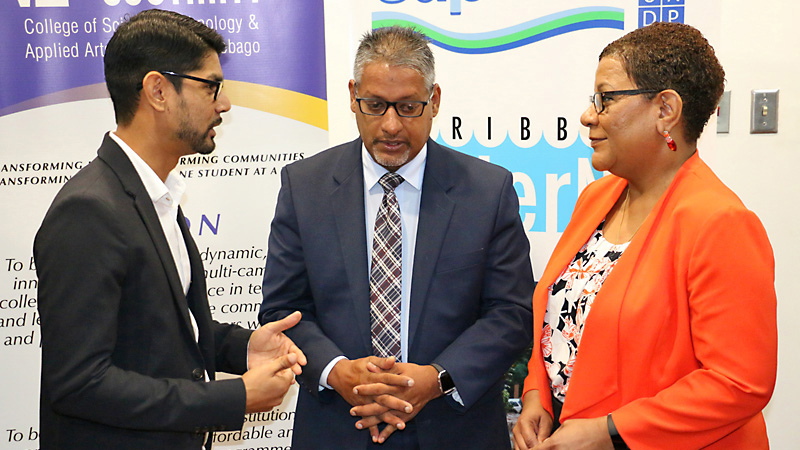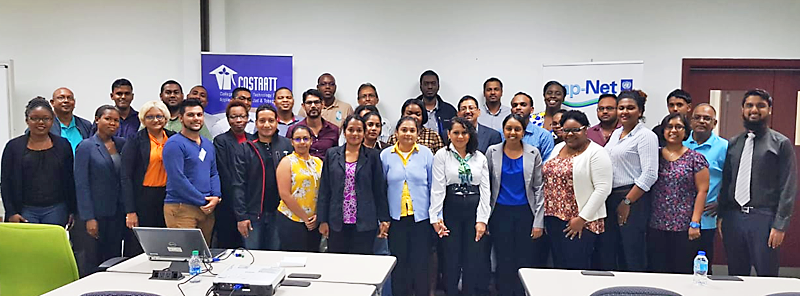The United National Office for Disaster Risk Reduction has indicated that 90% of natural disasters are water-related. By 2050, rising populations in flood prone lands, climate change, deforestation, loss of wetlands and rising sea levels are expected to increase the number of people vulnerable to flood disaster to approximately two billion.
In the Trinidad and Tobago and by extension the Caribbean, flood risk management is a relatively new concept, and the knowledge surrounding the management and mitigation of flood risk management is, unfortunately, in its infancy stages.
Noting this gap, Cap-Net UNDP and Caribbean WaterNet hosted an Integrated Urban Flood Risk Mitigation and Management Workshop in collaboration with the College of Science, Technology and Applied Arts of Trinidad and Tobago (COSTAATT) at the Chaguanas Campus on 13–15 August 2018. The aim of the workshop was to sensitize and provide industry professionals with the information and tools to build management capacity of participants regarding water resources.
The Integrated Urban Flood Risk, Mitigation and Management Workshop was considered relevant and appropriate as Trinidad and Tobago was put on Riverine Flood Alert by Trinidad and Tobago Meteorological Service in the year 2017 as a result of increased rainfall activity associated with the passage of Tropical Storm Bret. During the last month of 2017, the twin island republic experienced increased rainfall which extended into January 2018. This lead to widespread flooding. As such, these occurrences indicated a need for a proactive approach to deal with the increasing possibility of floods, as well as the associated risks and appropriate methods of alleviation.
In the past, the Caribbean region placed very little emphasis on issues associated with flood risks, primarily due to its typical climatic conditions. However with the erratic and unpredictable rainfall activity, growing populations and industrial demands, specifically in the case of Trinidad and Tobago, it is imperative that more effort is placed on flood risk management.
In this regard, the need for a workshop was deemed critical based on the country’s present conditions. The course targeted disaster preparedness and management personnel, water resource managers, agriculturalists/farmers, planners, climatologist meteorologist, geographers, environmental managers and students. The training was intended to increase participants’ knowledge of the issues attached to flooding events and various management and mitigation techniques, plans and policies.
The workshop’s course content and sessions were facilitated by three specialists, Professor Jacob Opadeyi, Dr. Ronald Roopnarine and Dr. Mark Wuddivira. During the workshop participants learnt about flood occurrences, conditions that make nations vulnerable to flooding events, the role of climate change, mitigation strategies and the basic principles and concepts of an Integrated Water Resource Management approach. The workshop consisted of 36 participants from various state agencies and NGOs.
At the workshop’s opening ceremony Feature Speaker, the Honourable Clarence Rambharat, Minister of Agriculture, Land and Fisheries said various agencies need to work together to control flooding, as there is no control over the volume and frequency of rainfall. However, he said, it is possible to plan for what happens when rain falls the sporadic weather patterns are a cause for concern as it is one of the most glaring examples of climate change.
– As individuals, if we properly dispose of plastic bottles and household items, it will go a long way to relieving our drains and rivers, Rambharat said and added that there must be a plan in place to deal with heavy rainfall and the effects of flooding. He outlined the engineering solutions and disaster preparedness.
– We need to be taking care of the big and little problems such as clearing water courses, clearing underground drains, and stop the dumping of garbage in drains and rivers, he said on management.
Network Manager of Caribbean WaterNet Cap-Net UNDP and Senior Lecturer of COSTAATT’s Department of Natural and Life Sciences, Dr. Ronald Roopnarine called for a proactive approach to deal with the effects of flooding and emphasized the need for institutional cohesiveness.
First photo, from left to right: Dr. Ronald Roopnarine, Senator the Honourable Clarence Rambharat Minister of Agriculture, Land and Fisheries, Dr. Gillian Paul, President of COSTAATT. ')}


